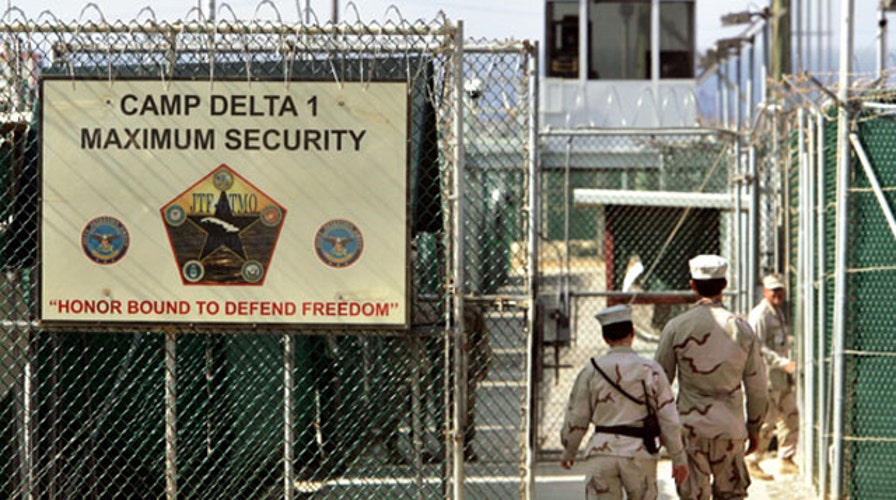Senate Intel report details CIA's interrogation methods
Catherine Herridge reports from Washington
Top CIA officials worked hard to promote the agency's interrogation program in the media, leaking classified -- and sometimes inaccurate -- information, a new Senate report says.
The Intelligence Committee study, released today by Sen. Dianne Feinstein, D-Calif., says CIA officials and their press office "provided unattributed background information on the program to journalists for books, articles, and broadcasts, including when the existence of the CIA's Detention and Interrogation Program was still classified." And when these journalists published the leaks, "the CIA did not, as a matter of policy, submit crimes reports" for violating the law.
Why did these journalists get a pass when the Bush administration was often complaining about leaks of classified data undermining national security? Because the officials were playing ball.
In the case of author Ron Kessler and his book "The CIA At War," Senior Deputy General Counsel John Rizzo wrote that the CIA made the decision because the agency's cooperation with Kessler had been "blessed" by the CIA's director.
A similar argument was offered about the cooperation with Douglas Jehl, then a New York Times reporter.
"Both the Kessler book and the Jehl article included inaccurate claims about the effectiveness of CIA interrogations, much of it consistent with the inaccurate information being provided by the CIA to policymakers at the time," the committee's report says. In the case of Kessler's book, it says, this involved claims about whether the waterboarding and interrogation of Khalid Sheikh Mohammed, the self-described planner of the 9/11 attacks, led to the arrest of a Pakistani-American who was providing help to Al Qaeda.
The CIA is renowned as a secretive organization. But behind the scenes, senior staffers worked hard to put a positive spin on its controversial interrogation program, denounced by critics as torture, and to prepare officials for interviews with the likes of NBC anchor Tom Brokaw.
In a revealing passage, Philip Mudd, deputy director of the CIA's Counterterrorism Center, said that "maybe people should know we're trying to sell their program, if they complain, they should know that we're trying to protect our capability to continue, we're not just out there to brag ... they don't realize that we have few options here, we either get out and sell, or we get hammered, which has implications beyond the media, congress reads it, cuts our authorities, messes up our budget, we need to make sure the impression of what we do is
positive ... we must be more aggressive out there, we either put out our story or we get eaten, there is no middle ground."
In this view, the media war was crucial to the war on terror.
In 2005, as scheduled interviews with "Dateline NBC" approached, there was an internal debate about whether releasing a list of "plot disruptions" would pose legal problems. Some officials argued that CIA Director Porter Goss and Mudd should not talk to NBC so that "we don't get a head [sic] of ourselves."
But Goss and Mudd did the interviews anyway, and the NBC magazine show was given information contending that the interrogation program had produced certain successes in the war on terror. "This information was inaccurate," the Senate report says. "There are no CIA records to indicate that there was any investigation or crimes report submitted in connection with the Dateline NBC program and its associated reporting."
The agency was determined to push its point of view in the media -- but wanted no fingerprints. In 2005, "the CIA drafted an extensive document" describing the interrogation program "for an anticipated media campaign." But CIA lawyers warned against having these off-the-record disclosures tied to the CIA itself. One senior attorney said a proposed press briefing was "minimally acceptable, but only if not attributed to a CIA official." The attorney said: "This should be attributed to an 'official knowledgeable' about the program (or some similar obfuscation), but should not be attributed to a CIA or intelligence official."
Perhaps only in the spy world is obfuscation considered a plus.
In 2007, the report says, the CIA decided to cooperate with Kessler on another book, about the Sept. 11 attacks, to "push back" on his account, including the interrogation of Abu Zubaydah, a Saudi Arabian suspect who was repeatedly waterboarded and is being held at Guantanamo Bay. The problem, a CIA officer said, was that Kessler's account would "give undue credit to the FBI for CIA accomplishments." This was apparently a hot button because of the long-standing rivalry between the agencies.
It is hardly unprecedented for government officials to press authors to include material more favorable to their agency, and in this case the effort appeared to be successful.
In an email to the agency's top spokesman, Kessler provided the "substantive changes" he had made to his draft after meeting with CIA officials. The changes included the statement that Zubaydah was subjected to "coercive interrogation techniques" after he "stopped cooperating," and that "the CIA could point to a string of successes and dozens of plots that were rolled up because of coercive interrogation techniques."
Kessler says in an interview that "it wasn't a so-called leak ... I had a number of interviews with the CIA and they gave me lots of information and this was corroborated by the FBI people who were on that case." He calls the Senate report "absurd and a fraud," saying that President Obama's former CIA director, Leon Panetta, has publicly acknowledged the benefits gleaned from enhanced interrogation of terror suspects.
"My track record is I call it like it is," Kessler says, "and I've exposed the CIA many times over their foibles."





